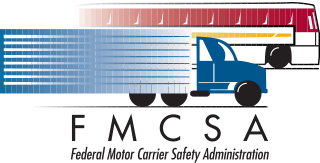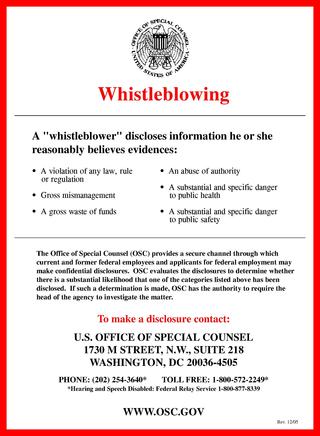The Occupational Safety and Health Administration is a regulatory agency of the United States Department of Labor that originally had federal visitorial powers to inspect and examine workplaces. The United States Congress established the agency under the Occupational Safety and Health Act, which President Richard M. Nixon signed into law on December 29, 1970. OSHA's mission is to "assure safe and healthy working conditions for working men and women by setting and enforcing standards and by providing training, outreach, education, and assistance." The agency is also charged with enforcing a variety of whistleblower statutes and regulations. OSHA's workplace safety inspections have been shown to reduce injury rates and injury costs without adverse effects on employment, sales, credit ratings, or firm survival.
Congressional staff are employees of the United States Congress or individual members of Congress. The position first developed in the late 19th century, and it expanded significantly during the 20th century. Staffers may work with individual members of Congress, or they may be associated with committees or other organizations that support Congress.

Gwendolynne Sophia Moore is an American politician serving as the U.S. representative for Wisconsin's 4th congressional district since 2005. In 2016, Moore was elected to serve as caucus whip of the Congressional Black Caucus for the 115th United States Congress. She is a member of the Democratic Party. Her district is based in Milwaukee and as a result of the 2011 redistricting also includes some Milwaukee County suburbs: Bayside, Brown Deer, Cudahy, Fox Point, Glendale, St. Francis, South Milwaukee, West Milwaukee, Shorewood, and Whitefish Bay. Moore is the first woman to represent the district and the second woman after Tammy Baldwin and the first African American elected to Congress from Wisconsin.

The United States Office of Special Counsel (OSC) is a permanent independent federal investigative and prosecutorial agency whose basic legislative authority comes from four federal statutes: the Civil Service Reform Act, the Whistleblower Protection Act, the Hatch Act, and the Uniformed Services Employment and Reemployment Rights Act (USERRA). OSC's primary mission is the safeguarding of the merit system in federal employment by protecting employees and applicants from prohibited personnel practices (PPPs), especially reprisal for "whistleblowing." The agency also operates a secure channel for federal whistleblower disclosures of violations of law, rule, or regulation; gross mismanagement; gross waste of funds; abuse of authority; and substantial and specific danger to public health and safety. In addition, OSC issues advice on the Hatch Act and enforces its restrictions on partisan political activity by government employees. Finally, OSC protects the civilian employment and reemployment rights of military service members under USERRA. OSC has around 140 staff, and the Special Counsel is an ex officio member of Council of Inspectors General on Integrity and Efficiency (CIGIE), an association of inspectors general charged with the regulation of good governance within the federal government.
Congressional oversight is oversight by the United States Congress over the executive branch, including the numerous U.S. federal agencies. Congressional oversight includes the review, monitoring, and supervision of federal agencies, programs, activities, and policy implementation. Congress exercises this power largely through its congressional committee system. Oversight also occurs in a wide variety of congressional activities and contexts. These include authorization, appropriations, investigative, and legislative hearings by standing committees; which is specialized investigations by select committees; and reviews and studies by congressional support agencies and staff.

The Federal Motor Carrier Safety Administration (FMCSA) is an agency in the United States Department of Transportation that regulates the trucking industry in the United States. The primary mission of the FMCSA is to reduce crashes, injuries, and fatalities involving large trucks and buses.
Compliance training refers to the process of educating employees on laws, regulations and company policies that apply to their day-to-day job responsibilities. An organization that engages in compliance training typically hopes to accomplish several goals: (1) avoiding and detecting violations by employees that could lead to legal liability for the organization; (2) creating a more hospitable and respectful workplace; (3) laying the groundwork for a partial or complete defense in the event that employee wrongdoing occurs despite the organization's training efforts; and (4) adding business value and a competitive advantage.

The 115th United States Congress was a meeting of the legislative branch of the United States of America federal government, composed of the Senate and the House of Representatives. It met in Washington, D.C., from January 3, 2017, to January 3, 2019, during the final weeks of Barack Obama's presidency and the first two years of Donald Trump's presidency. The seats in the House were apportioned based on the 2010 United States census.
The Congressional Accountability Act of 1995 (CAA), the first piece of legislation passed by the 104th United States Congress, applied several civil rights, labor, and workplace safety and health laws to the U.S. Congress and its associated agencies, requiring them to follow many of the same employment and workplace safety laws applied to businesses and the federal government. Previously, agencies in the legislative branch had been exempt from these laws. The act also established a dispute resolution procedure as an alternative to filing claims in federal court. The act is administered and enforced by the Office of Congressional Workplace Rights.
The Congressional Review Act (CRA) is a law that was enacted by the United States Congress as Subtitle E of the Contract with America Advancement Act of 1996 and signed into law by President Bill Clinton on March 29, 1996. The law empowers Congress to review, by means of an expedited legislative process, new federal regulations issued by government agencies and, by passage of a joint resolution, to overrule a regulation. Once a rule is thus repealed, the CRA also prohibits the reissuing of the rule in substantially the same form or the issuing of a new rule that is substantially the same "unless the reissued or new rule is specifically authorized by a law enacted after the date of the joint resolution disapproving the original rule". Congress has a window of time lasting 60 legislative days to disapprove of any given rule by simple-majority vote; otherwise, the rule will go into effect at the end of that period.
In the United States, there is no unified federal ombudsman service. The role of handling complaints against federal authorities has to some extent been unofficially incorporated into the role of the US Member of Congress. This informal job has become increasingly time-consuming. It is subject to criticism on the grounds that it interferes with a legislator's primary duty, namely to read and be knowledgeable about a bill before casting his or her vote.

A whistleblower is a person who exposes any kind of information or activity that is deemed illegal, unethical, or not correct within an organization that is either private or public. The Whistleblower Protection Act was made into federal law in the United States in 1989.

Susan Lynn Brooks is an American prosecutor and politician. She is a Republican and the former U.S. Representative for Indiana's 5th congressional district. She was elected in 2012. The district includes the northern fifth of Indianapolis, as well as many of the city's affluent northern and eastern suburbs. Brooks served as the United States Attorney for the Southern District of Indiana from 2001 to 2007.

The Sexual Harassment of Women at Workplace Act, 2013 is a legislative act in India that seeks to protect women from sexual harassment at their place of work. It was passed by the Lok Sabha on 3 September 2012. It was passed by the Rajya Sabha on 26 February 2013. The Bill got the assent of the President on 23 April 2013. The Act came into force from 9 December 2013. This statute superseded the Vishaka Guidelines for Prevention Of Sexual Harassment (POSH) introduced by the Supreme Court (SC) of India. It was reported by the International Labour Organization that very few Indian employers were compliant to this statute. Most Indian employers have not implemented the law despite the legal requirement that any workplace with more than 10 employees need to implement it. According to a FICCI-EY November 2015 report, 36% of Indian companies and 25% among MNCs are not compliant with the Sexual Harassment Act, 2013. The government has threatened to take stern action against employers who fail to comply with this law.
Sexual harassment in the workplace in US labor law has been considered a form of discrimination on the basis of sex in the United States since the mid-1970s. There are two forms of sexual harassment recognized by United States law: quid pro quo sexual harassment and behavior that creates a hostile work environment. It has been noted that a number of the early sexual harassment cases were brought by African American women and girls.

The Forced Arbitration Injustice Repeal (FAIR) Act is proposed legislation in the US Congress. The comprehensive legislation would prohibit pre-dispute, forced arbitration agreements from being valid or enforceable if it requires forced arbitration of an employment, consumer, or civil rights claim against a corporation.
The Royal Canadian Mounted Police (RCMP) is Canada's national police force established in 1920 after the Cabinet moved to have the Royal North-West Mounted Police absorb the Dominion Police. The RCMP's primary mandate is to maintain "peace and order," and Officers provide police services to all Canadian provinces, excluding Québec and Ontario, as well as to the three Canadian territories, and more than 180 municipalities and Indigenous communities.

Susan Tsui Grundmann is an American attorney who has been confirmed by the U.S. Senate to serve as a member of the Federal Labor Relations Authority.









